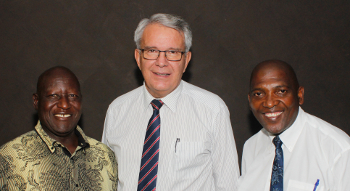Latest News Archive
Please select Category, Year, and then Month to display items
20 December 2020
|
Story Thabo Kessah
|
Photo Thabo Kessah
 Mbuyiselwa Moloi with student volunteers, Keamogetswe Mooketsi (presenter), Tshumelo Phaladi (producer), and Siphamandla Shabangu (SRC member – Social Justice and Universal Access).
Mbuyiselwa Moloi with student volunteers, Keamogetswe Mooketsi (presenter), Tshumelo Phaladi (producer), and Siphamandla Shabangu (SRC member – Social Justice and Universal Access).
The month of October 2020 marked the first anniversary of the Qwaqwa Campus online student radio, Q-Lit. “It has been a rocky road of sleepless nights, tears, and a lot of challenges. However, we have grown from strength to strength. We have made dreams of ordinary students possible. We have influenced change and inspired students to tap into their talents and potential,” said an elated station manager, Mbuyiselwa Moloi.
The station came in handy during the worst lockdown period of the COVID-19 pandemic when it bridged the communication gap between students and the university to integrate teaching and learning into the programming to ensure that no student was left behind. “With all of the regulations and online learning, Q-Lit had to be reinvented. While it was not an easy journey, we have grown more than ever before. Our August 2020 report shows that we have pulled in more than 1 600 listeners, even amid the learning, unlearning, and relearning processes. It was during this month that we also ran a series highlighting strategic offices led by women on campus as part of our Women’s Month celebration,” Mbuyiselwa revealed.
Looking to the future, the station hopes to obtain a full broadcasting licence from the regulatory body, the Independent Communication Authority of South Africa (ICASA), soon.
New developments in the Faculty of Theology and Religion
2017-08-30

Bishop JM Khumalo, Apostolic Church of
Christ; Prof Fanie Snyman, Dean of the
Faculty of Theology and Religion; and
Rev Simon Galada, Wesleyan Church,
at the faculty’s official opening in
February 2017.
Photo: Eugene Seegers
At a meeting of the UFS Council last year, a name change was accepted for the Faculty of Theology, renaming it to the Faculty of Theology and Religion. This change signals openness in approach to other religions, in addition to those of Christian denominations. This is a development that took root in Europe a few years ago. Furthermore, a growing field of interest is the study of the impact religion has had and still has, even in highly secularised societies. This name change is the first of its kind in South Africa, which means that the faculty will lead the way in transformation and impact-based religious studies.
Exciting times lie ahead
Prof Fanie Snyman, Dean of the faculty, says of these refinements: “The new name and restructuring of departments will lead to a new synergy that will have an impact on our teaching and research in the faculty. Exciting times lie ahead for the Faculty of Theology and Religion!”
Apart from the change in the name of the faculty, departments within the faculty were also regrouped, with new names. The Departments of Old Testament and New Testament merged to become the Department of Old and New Testament Studies, while the Departments of Systematic Theology and Ecclesiology merged and will now be known as the Department of Historical and Constructive Theology. The former Departments of Practical Theology and Missiology became the Department of Practical and Missional Theology. The Department of Religion Studies remained unchanged to emphasise the importance of religion in South Africa and the world at large.
Error! Hyperlink reference not valid.
Distinction of theological disciplines
The rationale for these groupings is the distinction of theological disciplines in terms of the study of texts (Old and New Testament), sources (Systematic Theology and Church History), and practices (Practical Theology and Missiology). One benefit of these newly-constructed departments is that they will be more cost-effective, but the more important advantage is that this will stimulate discussion and research across the various theological disciplines.